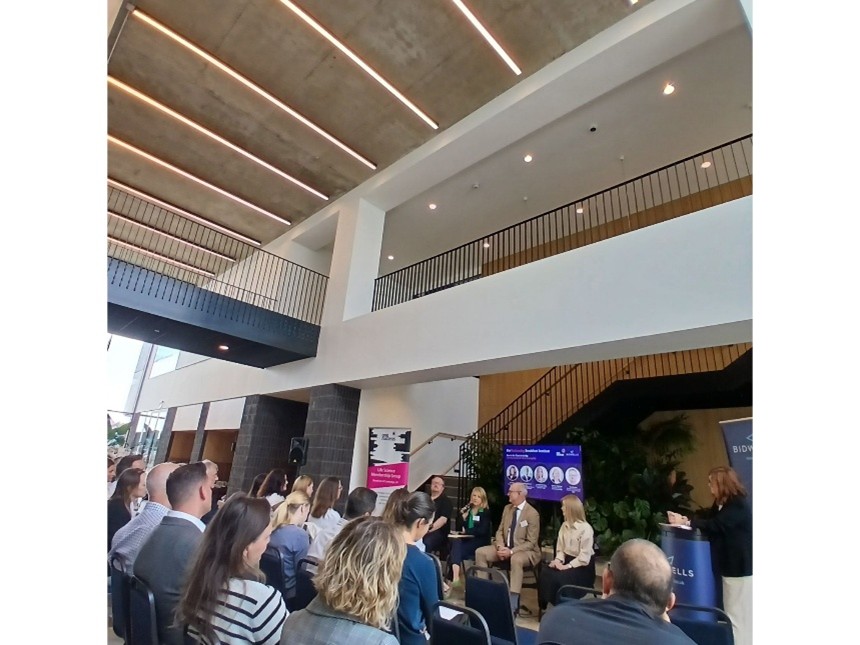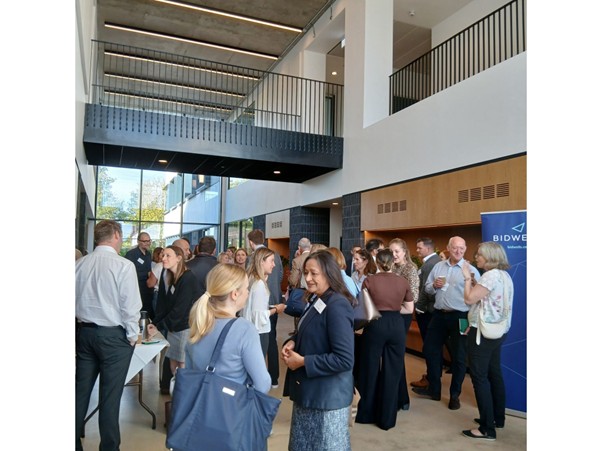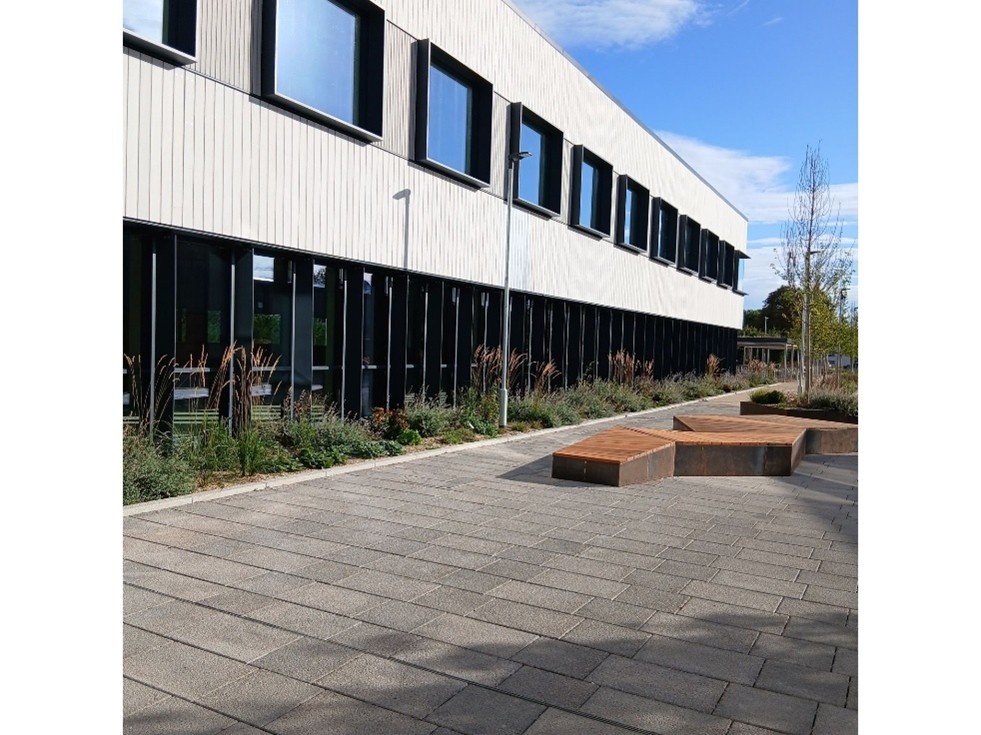By Alicia Gailliez, Business Development Manager, One Nucleus

On 10 September 2025, leaders from across the life sciences industry came together for a One Nucleus BioWednesday Breakfast Session, generously hosted by Mission Street at The Press in Foxton alongside Bidwells.
The session explored what it takes for science and technology companies, particularly spin-outs and early-stage ventures, to grow and scale effectively in the UK.
The panel was moderated by Sue Foxley (Bidwells) and comprised:

- Dr Nataly Hastings, CEO, Cellestial Health
- Dr Michael Murray, CEO, MetalloBio & Principal, Murray International Partners
- Dr Kathryn Chapman, Executive Director, Innovate Cambridge
- Paul Hughes, Managing Director, Life Sciences & Technology, BDO
Scaling is Systemic
Growth in life sciences is enabled by a variety of levers moving together in concert, as highlighted by Kathryn Chapman:
“Success depends on funding, space, talent and markets moving in tandem, not sequentially. Cambridge has moved from a lab space shortage to an investment challenge and now needs all growth levers aligned.” — Kathryn Chapman, Executive Director, Innovate Cambridge
While Cambridge has addressed some early pain points such as lab space and has good access to talent, the panel noted that the life science sector now broadly faces an investment challenge and companies may want to grow but lack access to sufficient financial resources. One of the standout findings from Bidwells’ Report “Now is the time to go big” is that UK companies receive just £1 in funding for every £8 their US counterparts secure.
Flexibility in Space
A key theme was the need for flexible infrastructure for companies at different stages. Some start-ups will operate virtually, while others need adaptable spaces that evolve as science and business teams grow.
“Given <Cellestial’s> strategy to follow best industry practices for small molecule drug development, outsourcing to CROs around the world makes more sense than building lab space from scratch as we aim to progress rapidly through diverse drug development stages. We can tap into leading global talent in a way that is quick and flexible.” — Dr Nataly Hastings, CEO, Cellestial Health
Health
The panel stressed the importance of providing both collaborative hubs and private, secure spaces for IP-sensitive and deep intellectual work.

Talent and Leadership
The panel explored the challenges faced by many early-stage companies, particularly those led by scientists who may lack formal leadership training. While some VCs offer mentoring and support, this is not always the case. A key takeaway was that a CEO should never operate in isolation. Building the right team comprising a strong board, experienced investors, mentors, and professional advisers is essential for successful scaling.
In the early stages, companies must prioritise robust science and validation while also assembling credible boards to strengthen both their proposition and leadership. One question raised during the discussion was whether there is a need for clearer signposting to structured training, mentoring, legal, and professional support. Although the Cambridge ecosystem offers a wealth of resources, some argued that accessing support is simply a matter of knowing where to look or being proactive in asking.
The Role of Funding
While pre-seed and seed funding are accessible for UK start-ups, many companies face a Series A+ crunch. Later-stage capital can sometimes be selective, often chasing trending sectors like AI or cell and gene therapy.
“We must align drug modalities, and therefore company growth strategies, with patient and market needs rather than chasing the latest ‘hot’ modalities. Success comes from building sustainable businesses that meet real challenges.” — Dr Nataly Hastings, CEO, Cellestial Health
As a result, companies are increasingly adopting a global scaling model, looking to international ecosystems rather than only local ones. Regions such as APAC were identified as emerging areas of opportunity.
“What you see now is a distributed scaling model; companies must look globally for talent, capital and patient populations. UK funding is often just a stepping stone to the bigger international markets.” — Paul Hughes, Managing Director of Life Sciences & Technology, BDO
Connecting the UK’s Life Science Ecosystem
The panel made it clear: Cambridge’s concentration of talent and companies is unique, but it cannot and should not try to thrive in isolation. To compete globally, the UK must build stronger connectivity between clusters, connecting talent, money, and capability across cities.
“Cambridge’s ecosystem is exceptional, but if we want to be globally competitive, we need to think of the UK as one life sciences cluster, connecting capabilities from Manchester to London, Oxford and beyond.” — Kathryn Chapman, Executive Director, Innovate Cambridge
Kathryn also proposed a mechanism to support organisations in building a presence across multiple innovation clusters in the UK, such as shared spaces to plug into and network, to help streamline collaboration between geographically distinct clusters.
Additional proposed enablers included infrastructure and support mechanisms, such as innovation labs and shared spaces, which serve as effective models for collaboration and knowledge-sharing, along with the NHS taking on the role of an early adopter to help validate emerging therapies and technologies.
The Property–Investment Feedback Loop
Cambridge’s economy is heavily driven by knowledge industries, especially life sciences. But the panel highlighted a risk: earlier space occupation is a direct result of funding availability, highlighting a vulnerability when funding dips. Property is enabling employment growth, but continued funding and improved market access are essential to keep the momentum going.
“Funding cycles drive lab demand in Cambridge. That link is both a strength and a vulnerability; it shows resilience but also highlights the need for consistent investment to sustain growth.” — Sue Foxley, Research Director, Bidwells
Conclusion
Scaling science and technology in the UK is about aligning space, talent and capital at the same time.
While Cambridge stands out as a world-class centre for scientific innovation, sustaining its growth depends on fostering collaboration across clusters, attracting global investment and partnerships, and ensuring flexible infrastructure that can adapt to evolving demand.

“Real estate for science isn’t just about beautiful spaces; it’s about creating environments that are truly fit for purpose, with the flexibility, confidentiality and technical capacity to allow science to thrive.” — Colin Brown, Development Director, Mission Street
With thanks to Bidwells for helping capture key insights and Paul Hughes (BDO) and Nataly Hastings (Cellestial Health) for editorial input.